How to delete your Google Web and App Activity automatically
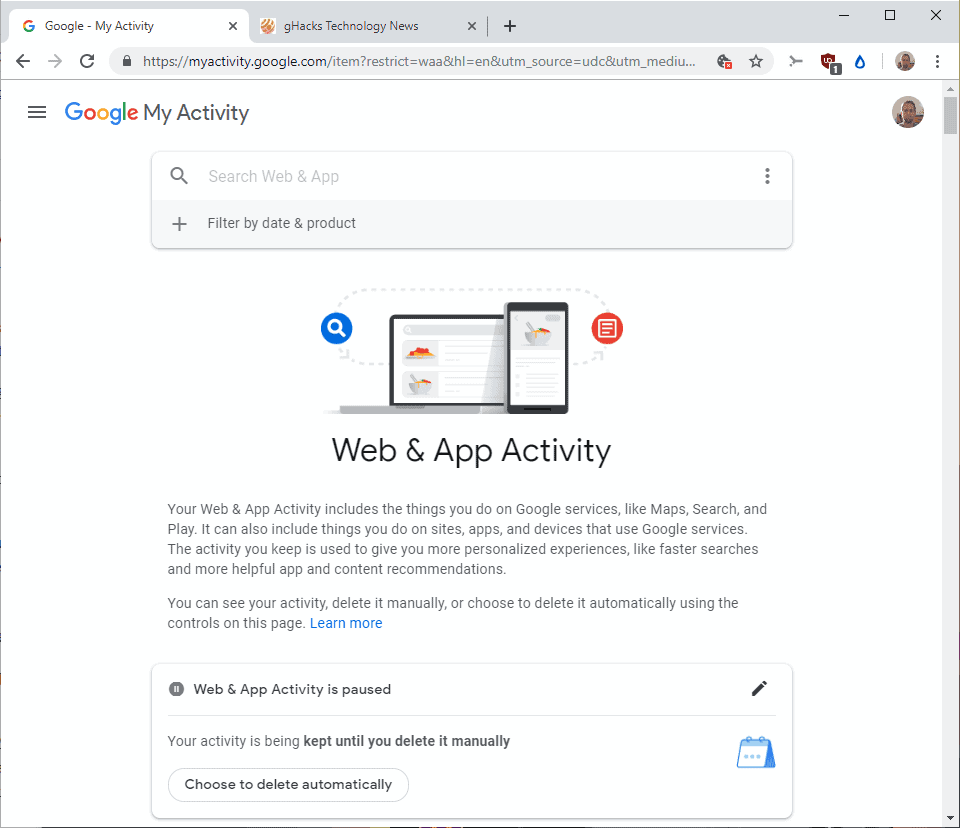
Google customers may use a new setting to have their web and application activity deleted automatically. The new feature complements the existing options to pause the recording of web and app activity and manual deletion of activity of a Google account.
Google revealed in the beginning of May 2019 that it was about to roll out a new privacy feature that would give customers options to have their activity deleted automatically.
The company gives customers control over the recording of some activity on the My Activity management page. Google customers find options on the page to manage YouTube, Web & App, Voice & Audio, Location, and Device activity and information.
All of these can be paused to disable the recording of activity; existing data may be deleted manually at any time.
Web & App Activity is the first control to get a new feature that automates the deletion of data. The new option may be of interest to Google customers who have not paused the recording of the activity data mostly.
Web & App Activity data is recorded when Google customers use services such as Maps, Google Search, or Google Play. Google notes that it uses the data to create personalized experiences.
Your Web & App Activity includes the things you do on Google services, like Maps, Search, and Play. It can also include things you do on sites, apps, and devices that use Google services. The activity you keep is used to give you more personalized experiences, like faster searches and more helpful app and content recommendations.
Tip: Google released a privacy checkup option in 2016 to audit privacy settings.
How to delete Google Web & Activity Data automatically

You may set up the automatic deletion of data of your Google activity even if you have paused Web & App Activity.
Here is how you configure the automatic deletion of Web & Activity Data on Google's My Activity management page:
- Visit the Web & App Activity page on the Google My Activity website. Note that you need to be signed in to a Google Account; if you are not, you are asked to sign in.
- Locate the new "choose to delete automatically" button under Web & App Activity near the top and activate it.
- Select one of the available data retention periods. Google offers two currently: 3 or 18 months.
- Select Next.
- Google displays a confirmation on the next page and data that will be deleted (if any) based on the new data retention setting.
- Select Confirm to finalize the process and enable the new data retention policy or cancel to exit without saving and deleting.
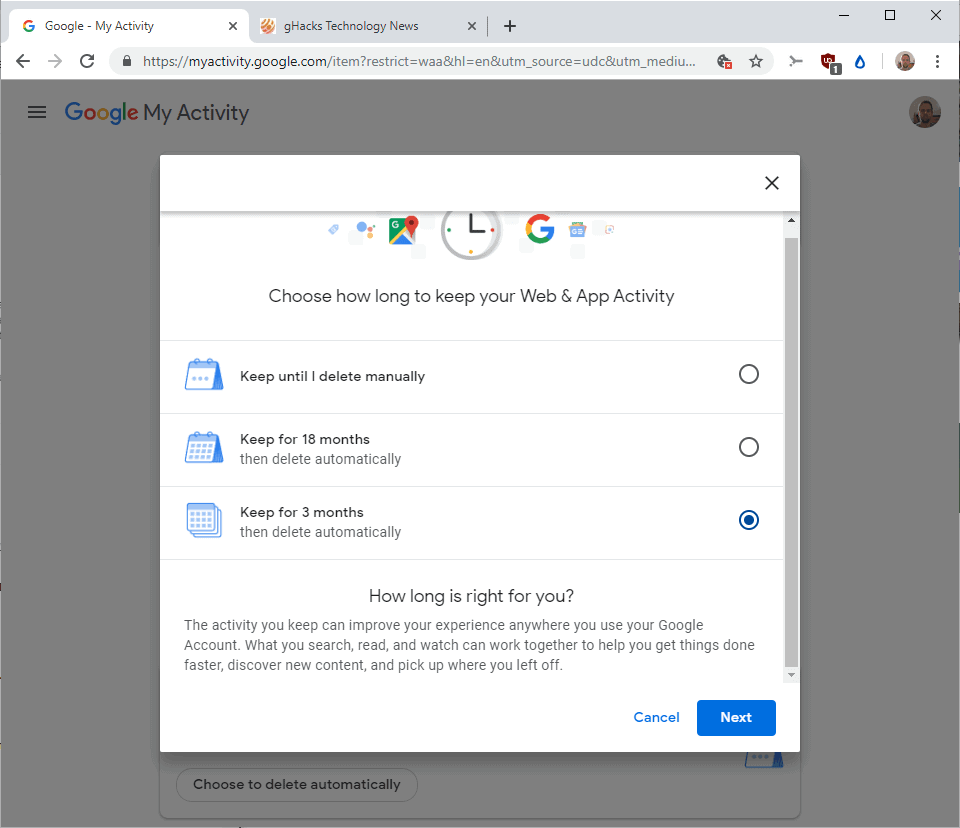
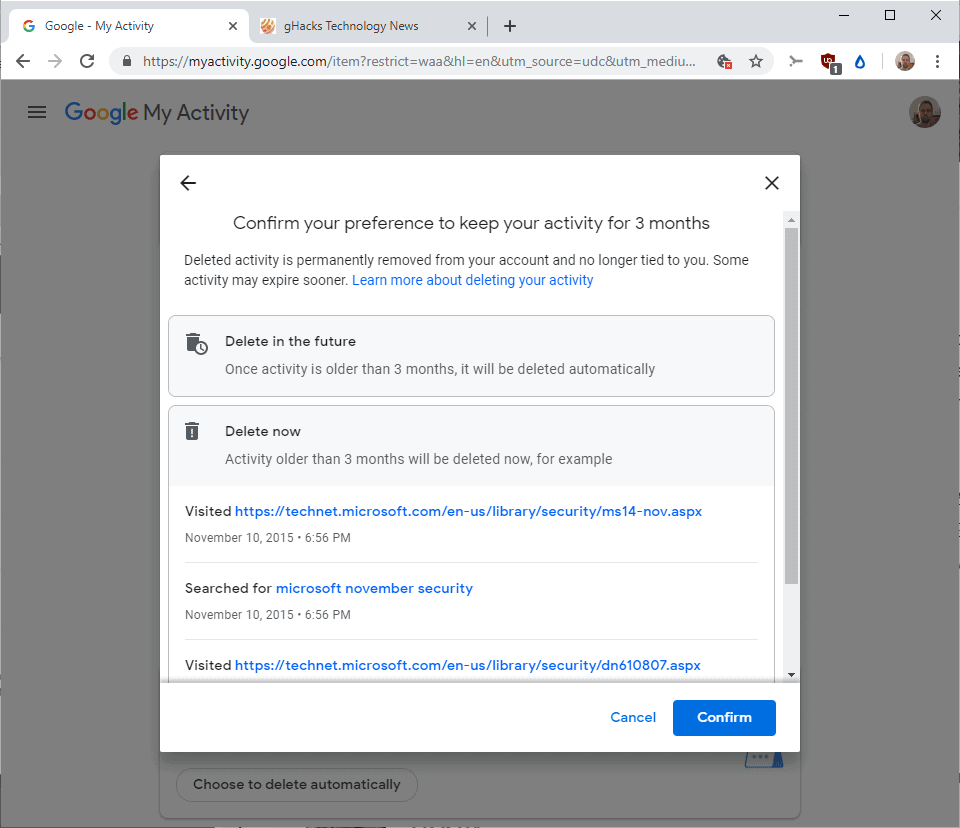
Google confirms the deletion of the data when you hit the confirm button. The button on the main Web & App Activity page changes to "choose how long to keep" from "choose to delete automatically" when you set up automatic deletion of activity data.
Google will delete activity data when it crosses the selected retention threshold.
Closing Words
Automatic deletion of data is a step in the right direction. I'd like to see an option to set a custom time period, e.g. 1 month or 1 year, as it would improve the option further. Privacy conscious users may want to disable the recording of activity or, preferred, avoid using Google services while signed-in to an account. The latter may not be possible all the time though depending on the activity on the Web.
Now You: What is your take on the new option?





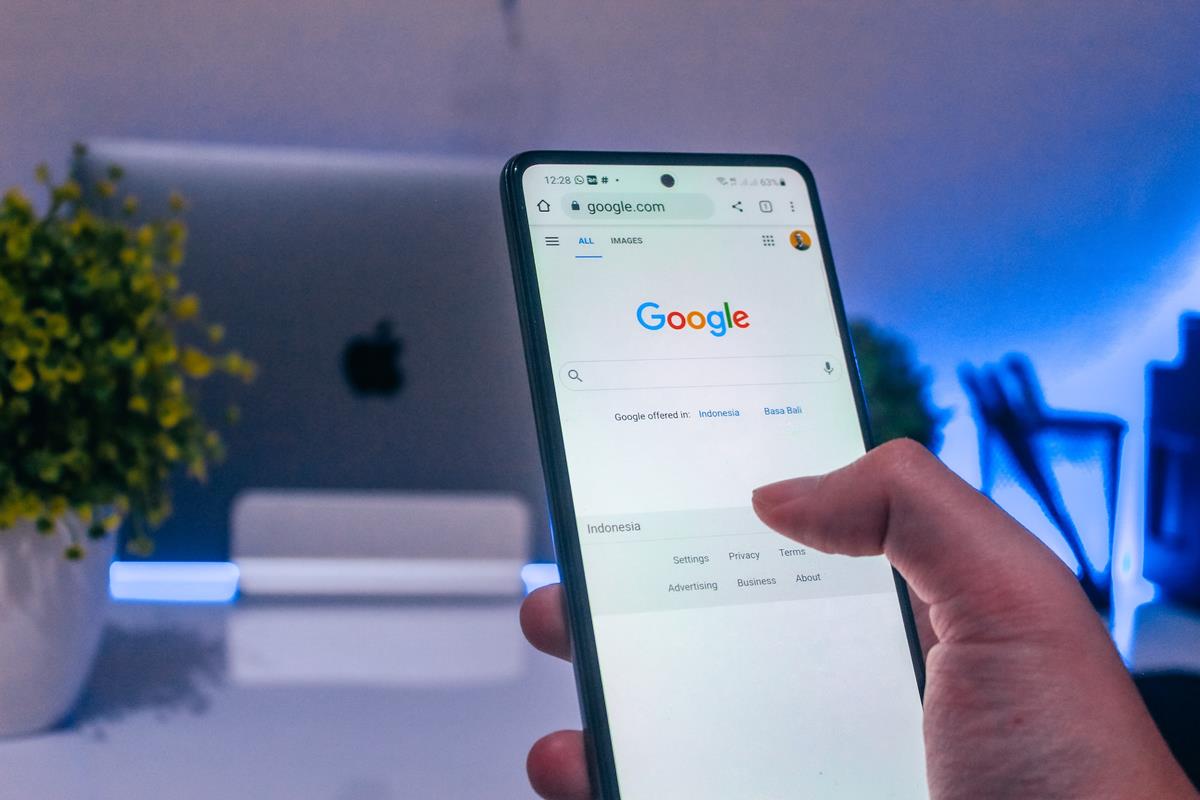






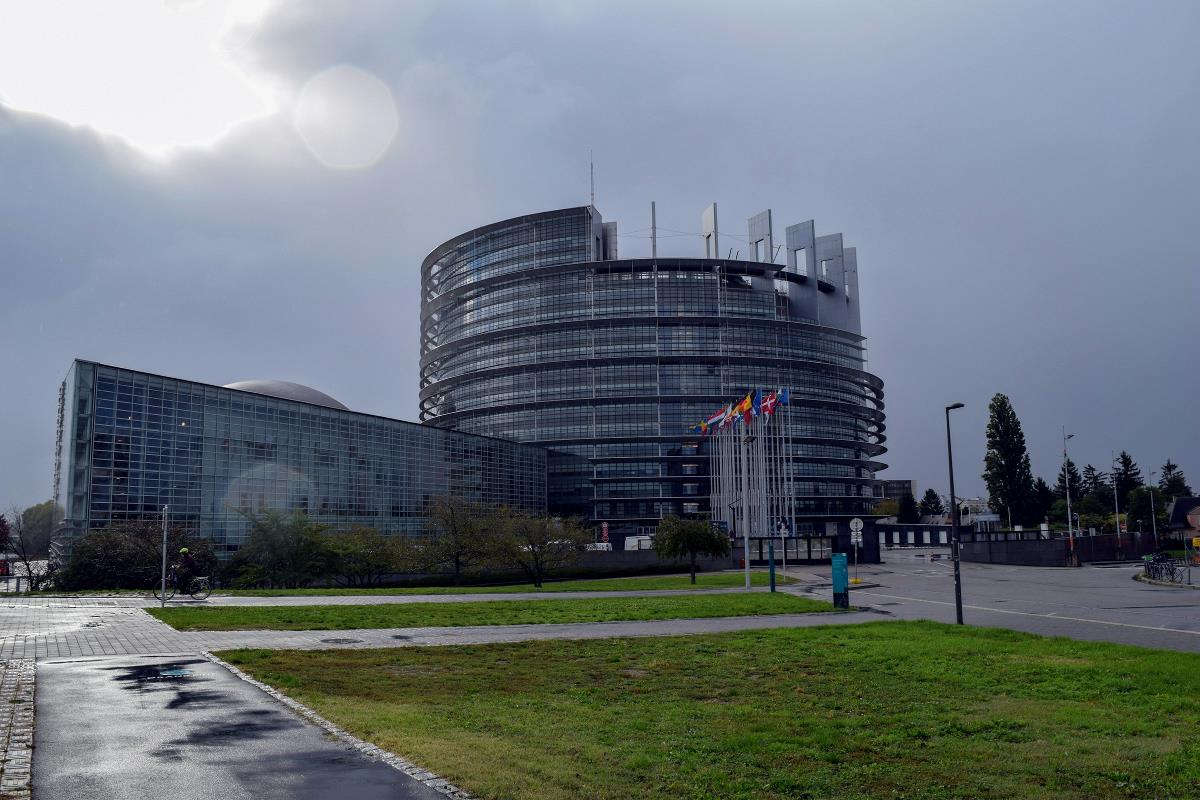









Would comment that Google has described which data you can see still and which not.
It did not even mention in the article that it might have archived it anyway. I have not had a bad experience with Google on this, in the Microsoft world which I belonged before did not even offer such a service.
I also find its interface much easier to understand and used it now regularly.
and I’m sure the google will actually delete all of your data from their servers…
What is done with the data collected? Not much beyond annoyances.
Basic experimental design, logic or plain common sense dictate that to make a reliable prediction a premise with assumptions must first exist before a causal relationship is proven.
Google and other ad companies chase you around online serving ads for items or similar items you’ve encountered browsing. Almost no one pays attention to any of these ads, they’re in the way of what users want to view; not very effective.
Now, so called AI is supposed to digest users online travels, voice, video streams, you name it and predict what we’re going to do next. I don’t know anyone who’s that predictable but do know many who deliberately play with data when they know they’re being surreptitiously observed.
With a proven history of poor data usage and control leading to repeated privacy debacles, I’m not interested in big “tech’s” try and fail methodology of herding an astronomical number of assumptions and possible outcomes.
It’s more annoyning to see ads for sanitary napkins and incontinence diapers. I am a young male, this kind of ads would be annoyning for me. Thanks to my collected data I don’t get ads with napkins and diapers. Many people pay attention to them, that’s why they make billions and are they are charged with billions.
I don’t get any ads except those I whitelist but whatever. An uncle who passed away years ago liked TV commercials; no one really understood why; to each their own.
You whitelist sites on your adblocker ULBoom. You have no control of the ads you get. About your comment about your uncle… So the youth today is so intitled to consume content on the internet and not giving back anything, that’s what you are saying. I agree on this, people are so intitled today and they are leechers.
Is it possible to delete Google Web logs without a google account?
@asd:
No, it’s not. I don’t know if Google does the whole “shadow profile” thing that Facebook does, though. It wouldn’t shock me if they do, but I haven’t heard anyone claim that.
You can only clear local data but that does not help you much.Does anyone know of an official page by Google that highlights what it collects from unsigned users / Chrome users, for what reason, and for how long it retains that data?
I too feel uncomfortable when ads start appearing based on web activity and it feels like someone is watching over your shoulder. In fairness , though, I think Google makes it reasonably easy to switch off Web activity history and this new feature is a further step in the right direc.
To those who don’t believe Google when they say they something – fair enough , that’s your opinion but the only solution then is to avoid Google services altogether. It also raises the question – who do you believe ? Do you believe what DuckDuckGo or Startpage say ?
It all is a matter of regulating what such corporations can and can not do. Their whole business is based on laws and regulations by the state… unfortunately most people are opposed to government regulations saying they can do that by them self but they can not.
In my personal opinion,deleting history on Google is bogus,I think you delete only what you can see and Google archives everything it has on you,it just gives you the fake sense of security that you have some modicum of privacy,come on people where talking Google here the biggest spyware ever invented!
Their algorithms create a virtual model of you out of your activities collected through all of Google’s services and tracking servers. Rather than storing data it analyzes the things you’re interested in, sites you visit most, content you view most, your contacts, etc, etc, etc. So legally they can say “sure we delete your data” but ask them if they have a profile of you for their “advertising” algorithm. Your profile is behavioral prediction analytic model so that they can target what you’re literally thinking about at any time and serve you up manipulative, suggestive “content” in Youtube, Search, Android and whatever else they have access to.
That’s just the innocent part of it. Who knows what else these psychological models are used for?
https://medium.com/intuitionmachine/deep-learning-to-predict-human-behavior-a2cd2ce14132
https://venturebeat.com/2018/06/21/xineoh-offers-ai-that-predicts-customer-behavior-with-scary-accuracy/
There is as of yet no option to OptIn into all of this.
Who does know what really is being done with all this data? It is not simply a feature to hide from view instead of delete?
The companies OS is still a purely privately regulated property which in itself is diametral to the inner workings of any democratic society. Having gained a monopoly not because they do no evil…
There is still no debate wether the company shall pay for all the data to those who owned and created it in the first place… or not.
To be able to integrate these technologies into modern democratic processes and societies on a local and national level (this is where most people live and identify) without a primary interference by privately held corporations.
In Switzerland the government wants to outsource i.e. privatise the handling and issuing of a future electronic ID, a verified passport for the internet so to say…
Who as the authority and control over all the peoples own data?
There is as of yet no option to OptIn into all of this.
Who does know what really is being done with all this data? It is not simply a feature to hide from view instead of delete?
The companies OS is still a purely privately regulated property which in itself is diametral to the inner workings of any democratic society. Having gained a monopoly not because they do no evil…
There is still no debate wether the company shall pay for all the data to those who owned and created it in the first place… or not.
To be able to integrate these technologies into modern democratic processes and societies on a local and national level (this is where most people live and identify) without a primary interference by privately held corporations.
In Switzerland the government wants to outsource i.e. privatise the handling and issuing of a future electronic ID, a verified passport for the internet so to say…
Who shall have the authority and control over all the peoples own data?